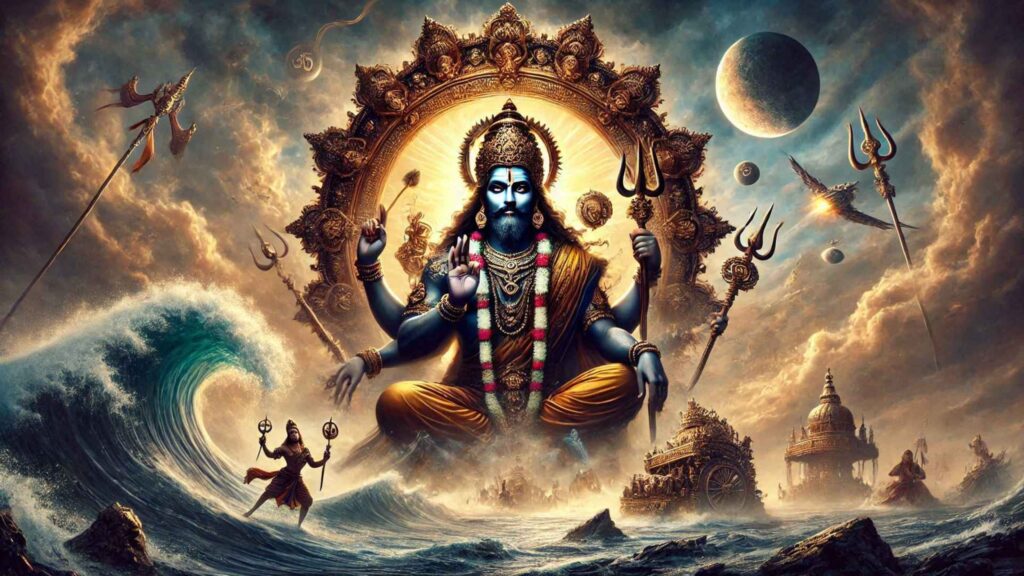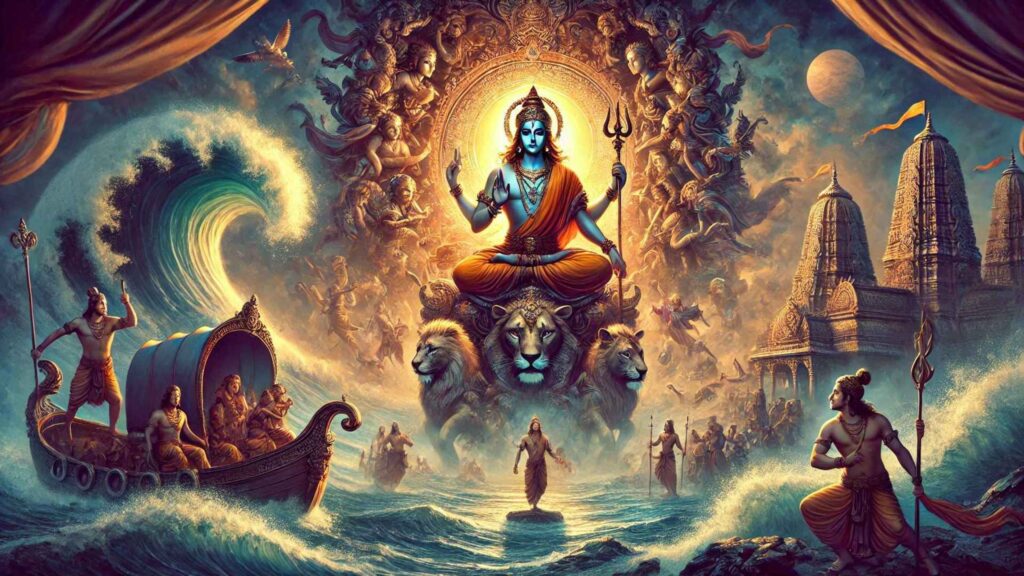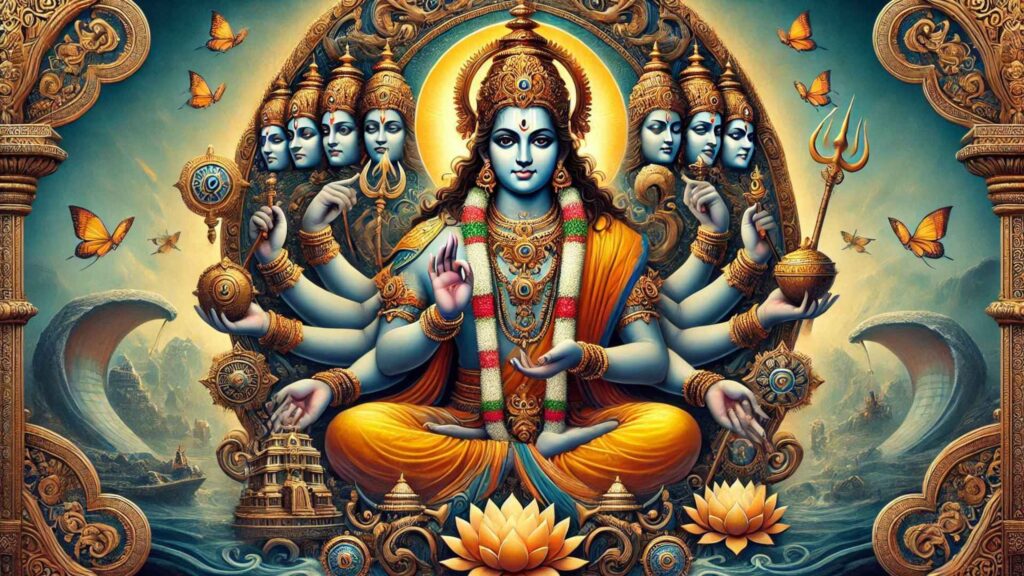Ishvara: The Supreme Controller and Personal God in Hinduism
Introduction
Ishvara, often translated as “Lord” or “Supreme Controller,” is a fundamental concept in Hindu philosophy and theology. As the personal manifestation of the divine, Ishvara embodies both the cosmic creator and the intimate guide for individual spiritual growth. Ishvara is revered across various schools of Hinduism as the ultimate power governing the universe, encompassing creation, preservation, and dissolution.
Read More About Deities And Gods
The concept of Ishvara bridges the abstract, impersonal Brahman and the personal connection that devotees seek with the divine. Ishvara is portrayed in diverse forms, often equated with deities like Shiva, Vishnu, or Shakti, depending on the tradition, yet remains universally acknowledged as the ruler of time, space, and all existence.
Significance of Ishvara in Hinduism
In Daily Hindu Life
Ishvara is invoked in prayers, rituals, and meditation as the source of blessings, guidance, and protection. Devotees look to Ishvara for strength in overcoming challenges, fulfillment of desires, and alignment with dharma (righteous living).
Cosmic and Spiritual Importance
Ishvara is the cosmic architect, orchestrating the laws of nature and the universe. Beyond the material realm, Ishvara serves as the guiding force for the soul’s journey toward moksha (liberation). In yoga and Vedanta, Ishvara is recognized as the supreme teacher who imparts divine knowledge.
Names and Etymology

Meaning of Ishvara
The word “Ishvara” is derived from the Sanskrit roots:
- Ish: To rule or command.
- Vara: Supreme or excellent.
Together, Ishvara means “the Supreme Ruler” or “Sovereign Lord.”
Other Names of Ishvara and Their Significance
- Maheshvara: The Great Lord, emphasizing Ishvara’s unmatched power.
- Parameshwara: The Supreme Lord, denoting his transcendence over all existence.
- Jagatpati: Lord of the Universe, symbolizing his dominion over creation.
- Satchidananda: Truth, Consciousness, and Bliss, reflecting his eternal and perfect nature.
Each name reflects Ishvara’s multifaceted attributes, from omnipotence to divine compassion.
Symbolism and Iconography

Physical Description of Ishvara
Ishvara is often visualized as a radiant being, seated on a lotus or throne, embodying serenity and divine majesty. Depending on the tradition, Ishvara may be depicted as:
- Vishnu: Holding a conch, discus, mace, and lotus, symbolizing protection and sustenance.
- Shiva: Meditating on Mount Kailash, representing asceticism and cosmic balance.
- Shakti: As a goddess, manifesting divine energy and nurturing power.
Symbolism
- Lotus: Represents purity and detachment from worldly attachments.
- Crown or Halo: Denotes divine authority and transcendence.
- Multiple Arms: Symbolize Ishvara’s omnipotence and ability to manage the universe.
- Mount (Vehicle): Varies by tradition (e.g., Garuda for Vishnu, Nandi for Shiva) and represents the qualities of the divine.
Flower Connection
Sacred flowers like the white lotus and bilva leaves are associated with Ishvara, symbolizing purity and spiritual devotion.
Colors and Symbols
- White: Purity and transcendence.
- Gold: Radiance and divine energy.
- Blue: Infinite and cosmic presence.
Mythology and Stories

Birth Story
Ishvara, as the eternal Lord, is uncreated and self-existent. However, various myths describe his manifestations:
- As Vishnu, Ishvara preserves the cosmos through avatars like Rama and Krishna.
- As Shiva, Ishvara destroys ignorance and transforms the universe.
- As Shakti, Ishvara nurtures creation with love and power.
Connection with Other Gods
Ishvara encompasses all deities, serving as their source and essence. He is often described as the unifying force behind the trinity of Brahma (creator), Vishnu (preserver), and Shiva (destroyer).
Role in the Ramayana and Mahabharata
- Ramayana: As Lord Rama, Ishvara exemplifies dharma and ideal living.
- Mahabharata: As Krishna, Ishvara delivers the Bhagavad Gita, teaching the path of devotion and selfless action.
Famous Blessings and Boons
Ishvara is revered as the granter of wisdom, liberation, and material blessings. His grace is believed to dissolve karma and align individuals with their spiritual purpose.
Spiritual Significance
A Visible Form of God
Ishvara provides a relatable form of the divine for worship and connection, making abstract principles accessible to devotees.
Representation of Knowledge and Enlightenment
Ishvara embodies Satchidananda—truth, consciousness, and bliss—guiding seekers toward the ultimate realization of the self.
Connection to Spiritual Awakening
Devotion to Ishvara fosters surrender, inner peace, and alignment with cosmic laws, leading to spiritual awakening.
Role in Yoga and Meditation
In Patanjali’s Yoga Sutras, Ishvara is identified as a spiritual guide, aiding practitioners in achieving self-mastery and liberation.
The Mantra Connection
A powerful mantra invoking Ishvara is:
“Om Namo Ishvaraya”
This mantra aligns the devotee’s mind with the divine, fostering peace and spiritual growth.
The Gayatri Mantra and Mahamrityunjaya Mantra are also associated with Ishvara, offering protection and enlightenment.
Worship and Rituals
Benefits of Worship
- Attains spiritual clarity and peace.
- Aligns one’s life with dharma.
- Removes obstacles and dissolves negative karma.
Daily Worship Practices
- Offering flowers, incense, and sacred food to Ishvara’s image.
- Chanting mantras and meditating on his form.
- Reading scriptures like the Bhagavad Gita and Shiva Purana.
Significance of Day
Thursdays and Mondays are considered auspicious for worshipping Ishvara, reflecting his aspects as Vishnu and Shiva.
Important Festivals
- Maha Shivaratri: Celebrating Ishvara as Shiva.
- Krishna Janmashtami: Honoring Ishvara as Krishna.
- Diwali: Worshipping Ishvara for prosperity and spiritual light.
Famous Temples
- Brihadeeswarar Temple, Tamil Nadu.
- Badrinath Temple, Uttarakhand.
- Pashupatinath Temple, Nepal.
Modern Relevance
Scientific Understanding
Ishvara’s principles align with universal laws, such as cause and effect (karma), emphasizing harmony with nature and mindfulness in actions.
Environmental Consciousness
Ishvara’s teachings inspire reverence for the environment, promoting sustainable practices and ecological balance.
Health Benefits
Meditating on Ishvara reduces stress, enhances focus, and fosters emotional resilience.
Cultural Impact
Influence on Indian Art and Architecture
Ishvara’s depictions are central to temple architecture, murals, and sculptures, symbolizing divine presence and cultural heritage.
Presence in Literature and Poetry
From the Vedas to modern devotional songs, Ishvara’s attributes inspire countless works of spiritual and literary significance.
Impact on Daily Customs
Ishvara’s name is invoked in rituals, prayers, and ceremonies, emphasizing his omnipresence in Hindu life.
Regional Variations in Worship
- South India: Focus on Ishvara as Shiva or Vishnu.
- North India: Emphasis on Krishna and Rama as forms of Ishvara.
Practical Applications
Morning Prayers and Rituals
Reciting Ishvara’s mantras at dawn fosters clarity, gratitude, and spiritual focus.
Dietary Recommendations
Observing a sattvic (pure) diet during his worship aligns with Ishvara’s principles of purity and harmony.
Astrological Significance
Ishvara’s blessings are sought to mitigate the effects of planetary doshas and bring peace and prosperity.
Gemstones and Metals
Yellow sapphire and gold resonate with Ishvara’s energy, symbolizing wisdom and abundance.
Conclusion
Ishvara represents the personal and cosmic divine, guiding humanity toward truth, harmony, and liberation. His worship fosters a deep connection with the eternal, inspiring a life of purpose, compassion, and spiritual fulfillment.


